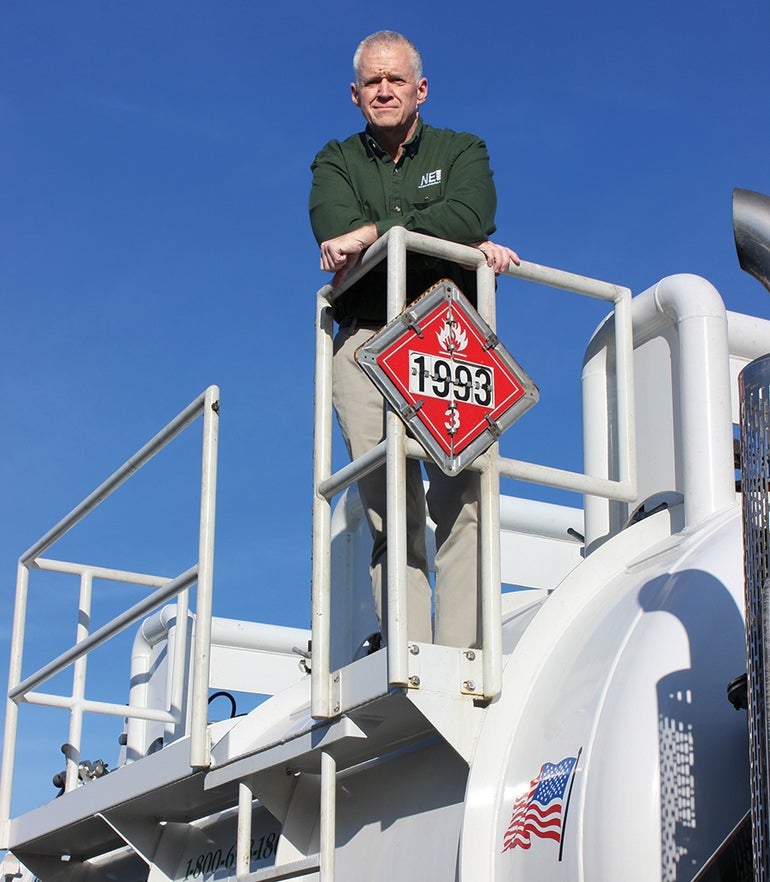For 25 years, Michael Robertson has been disposing clients’ chemicals and dealing with environmental contamination emergencies.
Get Instant Access to This Article
Subscribe to Worcester Business Journal and get immediate access to all of our subscriber-only content and much more.
- Critical Central Massachusetts business news updated daily.
- Immediate access to all subscriber-only content on our website.
- Bi-weekly print or digital editions of our award-winning publication.
- Special bonus issues like the WBJ Book of Lists.
- Exclusive ticket prize draws for our in-person events.
Click here to purchase a paywall bypass link for this article.
For 25 years, Michael Robertson has been disposing clients' chemicals and dealing with environmental contamination emergencies.
How did you end up in the industry?
My original plan was to be a pharmacist, and I took a job I thought would be just a summer job.
When I was in college, I didn’t really know this industry existed. Environmental cleanup wasn’t as mainstream as it is today. After I graduated and took a job in the industry, I found I was using a lot of what I learned in college. Since it was a growing industry, there was a lot of room for professional growth.
After making the rounds through a couple of large firms, I decided to start my own. We are a pretty small company in an industry dominated by large companies. We have the same equipment they have, but our focus has been to provide a customer-oriented, boutique service.
What services did you first offer?
When we opened, I had one employee, plus myself. We did laboratory cleanouts, gathering the chemicals for disposal. We still do those, although it is probably 10% of our business now.
As we got into certain industrial or commercial accounts, they would ask us if we could also do things like clean tanks, remove tanks, or do emergency spill cleanups. We added those services, since I figured if we just stuck with taking laboratory chemicals away, our clients would eventually find someone else who would do everything they needed.
What are your main revenue streams?
We have five major business segments: emergency oil and chemical spill response; chemical waste disposal; scheduled contaminated property cleanup; industrial maintenance services, such as cleaning tanks; and we do chemical waste disposal from households, where we have two permitted collection centers in the state and people can self-transport their household chemicals to us. We call that, “Pay as you throw.”
The household aspect is the newest part of our business. We used to be contacted a lot by households, saying they have paint cans, motor oil and cleaners; and we could not cost-effectively send a tractor-trailer to their house. You can’t tell some woman on the phone it was going to cost her $1,000.
So, we went through a permitting process through the Massachusetts Department of Environmental Protection, where people can bring the chemicals to us. They save on transportation costs, and they benefit from the economy of scale of us having these centers. It maybe costs them 10% of what it would cost for us to send out a tractor-trailer.
Is the industry growing?
The industry has had its ups and downs, but things are going well now. There is a strong environmental awareness, and over the last few years, we’ve had a lot more commercial property redevelopment. When people are taking old mills and turning them into condominiums, they need to make sure there is no old chemicals left and the soils on the property meet the residential standard, rather than the commercial standard.
What are the latest challenges?
Lately, we have been dealing with an emerging contaminant, which is referred to as PFAS. They are perfluoroalkyl substances, and it is a known carcinogen. It was a big ingredient in firefighting foam. The problem is it is very water soluble, and it finds its way into the drinking water supply. We’ve been working with the DEP to collect all this old firefighting foam manufactured prior to 2003.
What is your most memorable cleanup?
There have been a lot. In 2007, there was the Bernat Mill fire in Uxbridge, which was a large historic mill facility. We worked with the DEP and the Department of Fire Services to control hazardous chemical releases occuring in the waterways. We set up a series of containment areas between Uxbridge and Rhode Island to capture the oil flow, to prevent it from leaving the state. That lasted a couple of weeks.
Do you have a lot of surprise inspections from regulators?
Yes. Because of the nature of our business, we are regulated by many agencies: the U.S. Environmental Protection Agency on the federal level, the DEP on the state level, the Massachusetts Department of Transportation because we transport waste, and the U.S. Department of Homeland Security, where a big concern is cargo falling into the wrong hands.
It is a tremendous amount of paperwork.
This interview was conducted and edited for length and clarity by WBJ Editor Brad Kane.

